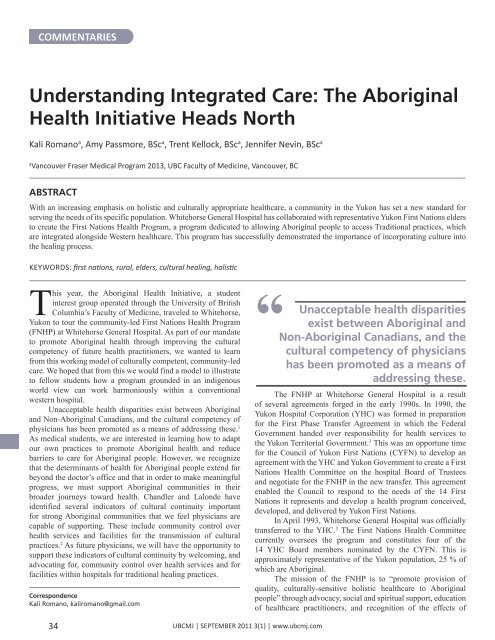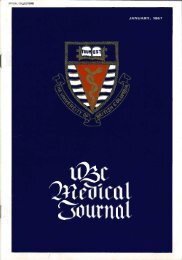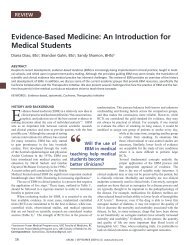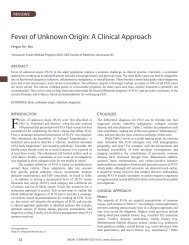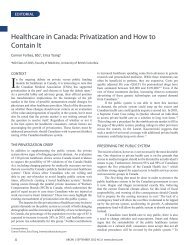Download full PDF - UBC Medical Journal
Download full PDF - UBC Medical Journal
Download full PDF - UBC Medical Journal
You also want an ePaper? Increase the reach of your titles
YUMPU automatically turns print PDFs into web optimized ePapers that Google loves.
COMMENTARIES<br />
Understanding Integrated Care: The Aboriginal<br />
Health Initiative Heads North<br />
Kali Romano a , Amy Passmore, BSc a , Trent Kellock, BSc a , Jennifer Nevin, BSc a<br />
a<br />
Vancouver Fraser <strong>Medical</strong> Program 2013, <strong>UBC</strong> Faculty of Medicine, Vancouver, BC<br />
ABSTRACT<br />
With an increasing emphasis on holistic and culturally appropriate healthcare, a community in the Yukon has set a new standard for<br />
serving the needs of its specific population. Whitehorse General Hospital has collaborated with representative Yukon First Nations elders<br />
to create the First Nations Health Program, a program dedicated to allowing Aboriginal people to access Traditional practices, which<br />
are integrated alongside Western healthcare. This program has success<strong>full</strong>y demonstrated the importance of incorporating culture into<br />
the healing process.<br />
KEYWORDS: first nations, rural, elders, cultural healing, holistic<br />
This year, the Aboriginal Health Initiative, a student<br />
interest group operated through the University of British<br />
Columbia’s Faculty of Medicine, traveled to Whitehorse,<br />
Yukon to tour the community-led First Nations Health Program<br />
(FNHP) at Whitehorse General Hospital. As part of our mandate<br />
to promote Aboriginal health through improving the cultural<br />
competency of future health practitioners, we wanted to learn<br />
from this working model of culturally competent, community-led<br />
care. We hoped that from this we would find a model to illustrate<br />
to fellow students how a program grounded in an indigenous<br />
world view can work harmoniously within a conventional<br />
western hospital.<br />
Unacceptable health disparities exist between Aboriginal<br />
and Non-Aboriginal Canadians, and the cultural competency of<br />
physicians has been promoted as a means of addressing these. 1<br />
As medical students, we are interested in learning how to adapt<br />
our own practices to promote Aboriginal health and reduce<br />
barriers to care for Aboriginal people. However, we recognize<br />
that the determinants of health for Aboriginal people extend far<br />
beyond the doctor’s office and that in order to make meaningful<br />
progress, we must support Aboriginal communities in their<br />
broader journeys toward health. Chandler and Lalonde have<br />
identified several indicators of cultural continuity important<br />
for strong Aboriginal communities that we feel physicians are<br />
capable of supporting. These include community control over<br />
health services and facilities for the transmission of cultural<br />
practices. 2 As future physicians, we will have the opportunity to<br />
support these indicators of cultural continuity by welcoming, and<br />
advocating for, community control over health services and for<br />
facilities within hospitals for traditional healing practices.<br />
Correspondence<br />
Kali Romano, kaliromano@gmail.com<br />
“<br />
Unacceptable health disparities<br />
exist between Aboriginal and<br />
Non-Aboriginal Canadians, and the<br />
cultural competency of physicians<br />
has been promoted as a means of<br />
addressing these.<br />
The FNHP at Whitehorse General Hospital is a result<br />
of several agreements forged in the early 1990s. In 1990, the<br />
Yukon Hospital Corporation (YHC) was formed in preparation<br />
for the First Phase Transfer Agreement in which the Federal<br />
Government handed over responsibility for health services to<br />
the Yukon Territorial Government. 3 This was an opportune time<br />
for the Council of Yukon First Nations (CYFN) to develop an<br />
agreement with the YHC and Yukon Government to create a First<br />
Nations Health Committee on the hospital Board of Trustees<br />
and negotiate for the FNHP in the new transfer. This agreement<br />
enabled the Council to respond to the needs of the 14 First<br />
Nations it represents and develop a health program conceived,<br />
developed, and delivered by Yukon First Nations.<br />
In April 1993, Whitehorse General Hospital was officially<br />
transferred to the YHC. 3 The First Nations Health Committee<br />
currently oversees the program and constitutes four of the<br />
14 YHC Board members nominated by the CYFN. This is<br />
approximately representative of the Yukon population, 25 % of<br />
which are Aboriginal.<br />
The mission of the FNHP is to “promote provision of<br />
quality, culturally-sensitive holistic healthcare to Aboriginal<br />
people” through advocacy, social and spiritual support, education<br />
of healthcare practitioners, and recognition of the effects of<br />
34<br />
<strong>UBC</strong>MJ | SEPTEMBER 2011 3(1) | www.ubcmj.com


